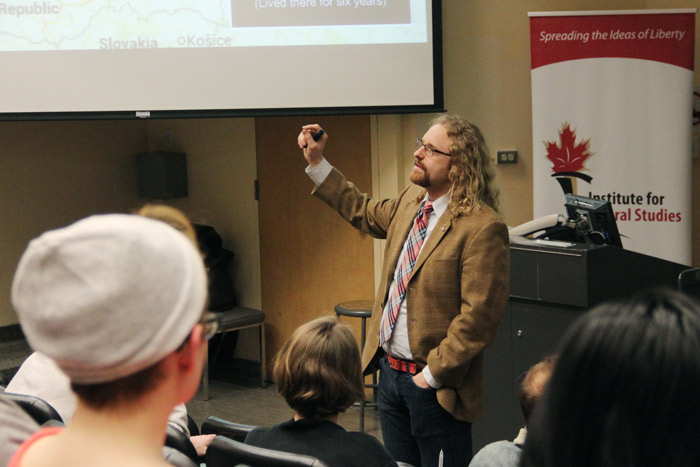On March 9, Georgetown Assistant Teaching Professor of business ethics and Director of the Institute for Liberal Studies Peter Jaworski delivered a talk to approximately 150 McGill students on the ethics of immigration. The talk was co-hosted by the Institute for Liberal Studies and the Research Group on Constitutional Studies.
Jaworski began by questioning the legitimacy of borders and aimed to answer the question of whether human beings have a moral obligation to be open towards immigration.
“Personal liberty is a presumption,” Jaworski said. “Under this presumption, as barriers to our personal liberties, borders require moral justification. While states have a right to enforce borders, having the right doesn’t make it right.”
Jaworski also discussed the logical implications of borders. He argued that if there is a criterion to bar someone from entering a country, that same criterion should be grounds to throw someone out.
“If culture, crime, jobs, and social insurance are reasons to keep immigrants out of Canada, then it follows that they are sufficient reasons to kick people out,” Jaworski said. “Yet no one has proposed citizen deportation if individuals do not meet the same stringent guidelines set for refugees.”
Several of Jaworski’s points were devoted to debunking myths about refugees, focusing on job security, and social insurance.
“For every job given to an immigrant, there is one fewer job available for a Canadian,” Jaworski said. “But Canadian children will slowly begin to replace older generations in the workforce. If we limit immigration for job security, it follows that we should limit or license parents for having children.”
Jaworski addressed fears of the consequences of immigration, giving historical examples to support his argument.
“One concern is that a ‘flood’ of immigrants will cause overcrowding and saturate the job market and health care systems,” Jaworski said. “Historically we have seen two major ‘floods’ to the American job market–U.S. soldiers and women after World War Two–both of which we were equipped to deal with. If the health care system cannot handle additional strain from a few immigrants, the problem is with the health care system.”
When an audience member asked about his opinion on non-assimilation, Jaworski stated that assimilation is unnecessary.
“Provided immigrants can learn the law, I’m alright with non-assimilation, at least with respect to learning the language,” Jaworski said. “There’s nothing wrong with staying in a self-contained community.”
An audience member raised concerns about cultural values that differ drastically from Canadian values, particularly those that might be discriminatory towards women.
“The problem only comes when your values are diametrically opposed to your country’s values, but even this is not a sufficient reason to bar immigrants from Canada,” Jaworski said. “Laws have been put in place to prevent crime and Canadian culture is not this fragile.”
Tomlinson Professor of Political Theory at McGill Jacob Levy attended the event and weighed in on the discussion, using an analogy relevant to the student-populated crowd.
“Universities only admit the students with the highest marks–students that they expect will perform incredibly well,” Levy said. “Some students will retain their high GPAs, but some will drop down to C-average. This is not enough to drop out, but we also don’t kick them out for failing to meet expectations. The same should hold true for refugees.”
Jaworski argued that the situations were different, but agreed that his argument had been too symmetrical.
“Sending refugees back to their home countries will not make their situations drastically worse, it will just land them back where they started,” Jaworski said. “We don’t kick C-students out of school because it would make things disproportionately bad for them.”
The event attracted both students and staff and was largely seen as a success by its organizers. Leila Feng, U1 Science, said that recent visa issues surrounding Trump’s executive order were a likely reason that the event was so popular.
“[…] Jaworski’s PowerPoint slides were concise, containing statistics that effectively supported his arguments,” Feng said. “His arguments on jobs and culture assimilation were well-delivered–particularly his point that native-born children will replace more jobs than refugees.”








